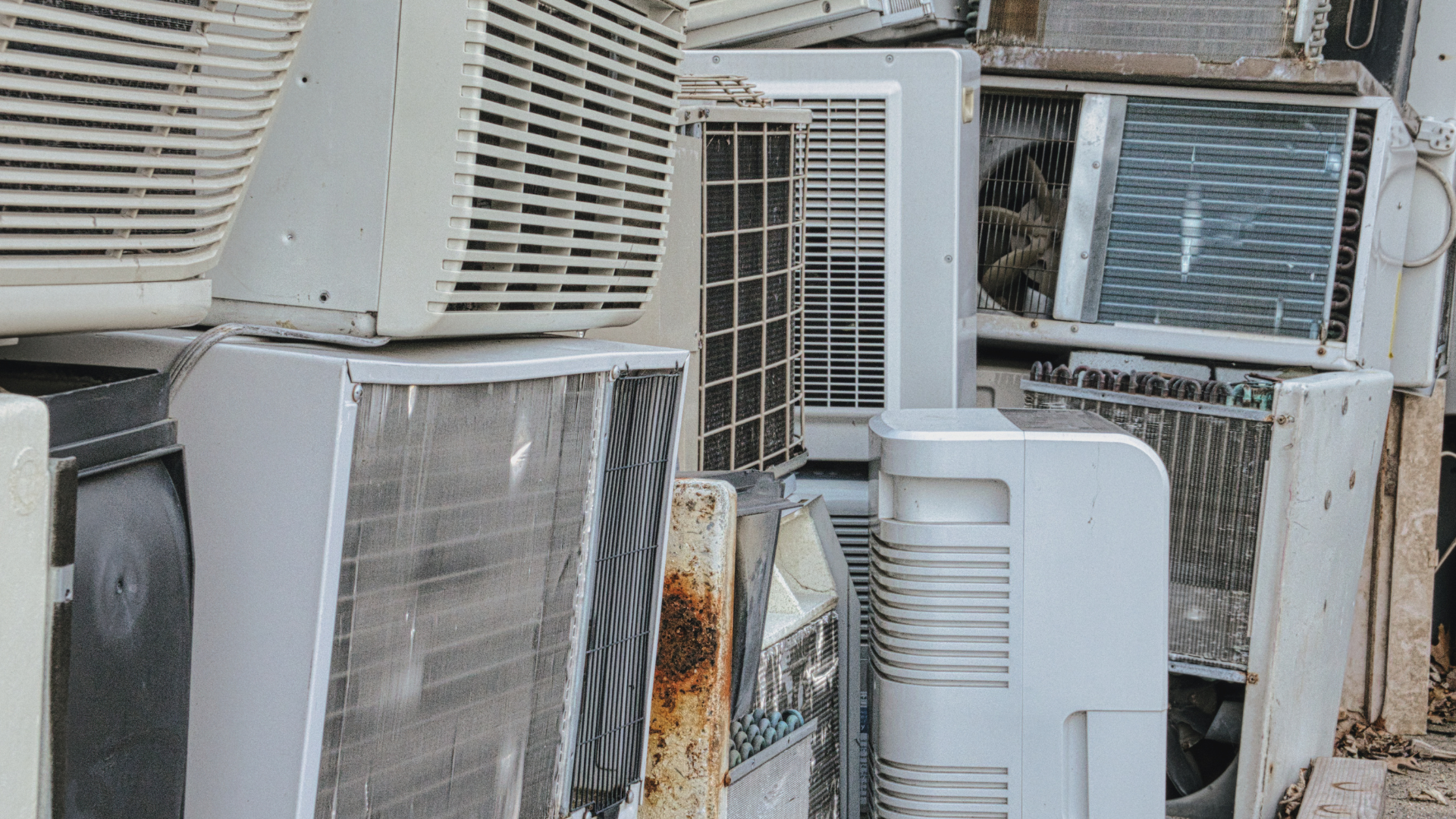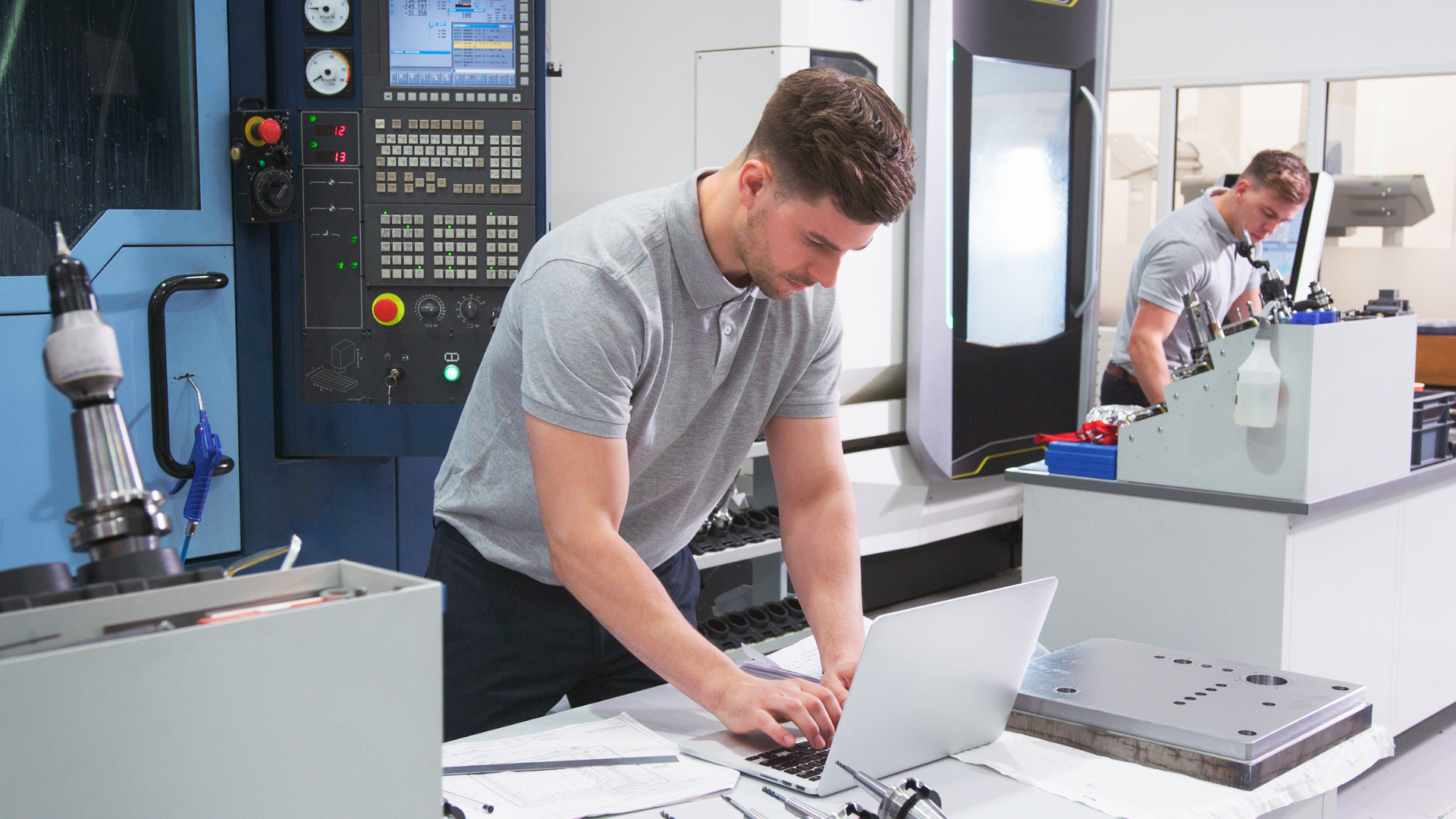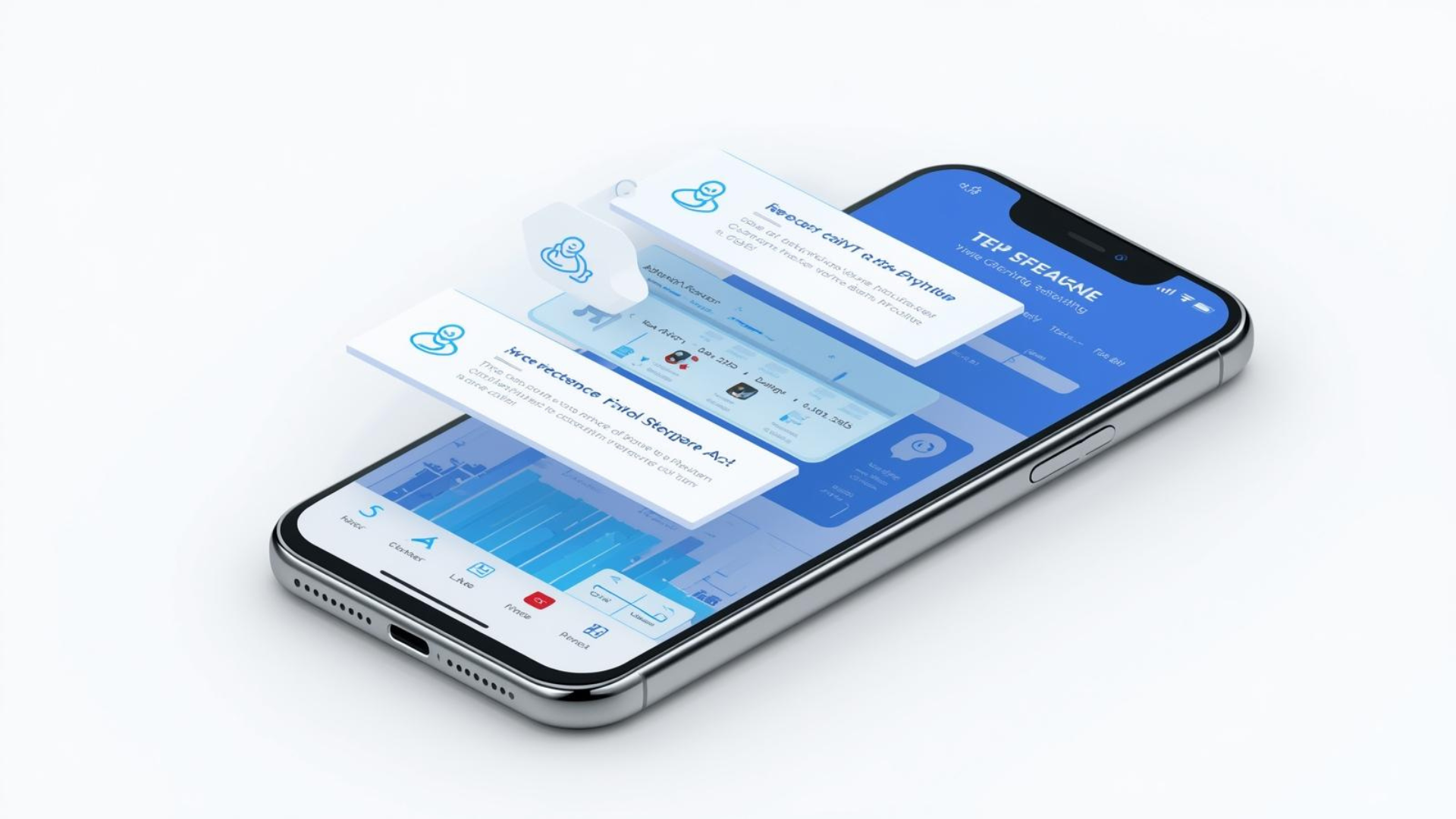Why HVAC Businesses Need CRM Software in 2025
In 2025, running an HVAC business without CRM software is like working with half your tools missing. Customers expect quick service, clear updates, and a smooth process from start to finish.
In a situation like this, HVAC CRM helps you stay organized, respond more efficiently, and foster stronger customer relationships. In this blog, we’ll explore why CRM software is essential for HVAC companies looking to grow and compete in today’s fast-moving market.
Why HVAC Companies Need CRM Software in 2025
Running an HVAC business in 2025 is nothing like it used to be. Customers now expect instant quotes, real-time updates, and seamless experiences, whether they're booking an air conditioning tune-up or a whole system install.
The pressure is real. But so is the opportunity.
That’s where HVAC CRM software steps in. It’s no longer just for the big dogs. Whether you’re running a two-truck outfit or managing multiple crews across town, a purpose-built CRM for HVAC businesses can be the difference between chaos and control.
In this guide, we’ll break down what HVAC CRM means, how it changes the game, and why ignoring it in 2025 could cost you more than leads. If your goal is to grow your customer base, boost customer satisfaction, and streamline daily operations, you’re in the right place.
Key Takeaways
- CRM is essential for HVAC businesses in 2025 to meet customer demands for instant updates, faster quotes, and seamless service.
- HVAC-specific CRMs integrate scheduling, invoicing, inventory, and field communication in one platform.
- Common mistakes to avoid are choosing generic CRMs, paying for unused features, lacking mobile support, and poor onboarding.
- HVACBase stands out with HVAC-focused workflows, AI scheduling, mobile sync, and affordable, scalable plans.
What Is HVAC CRM and Why Does It Matter?
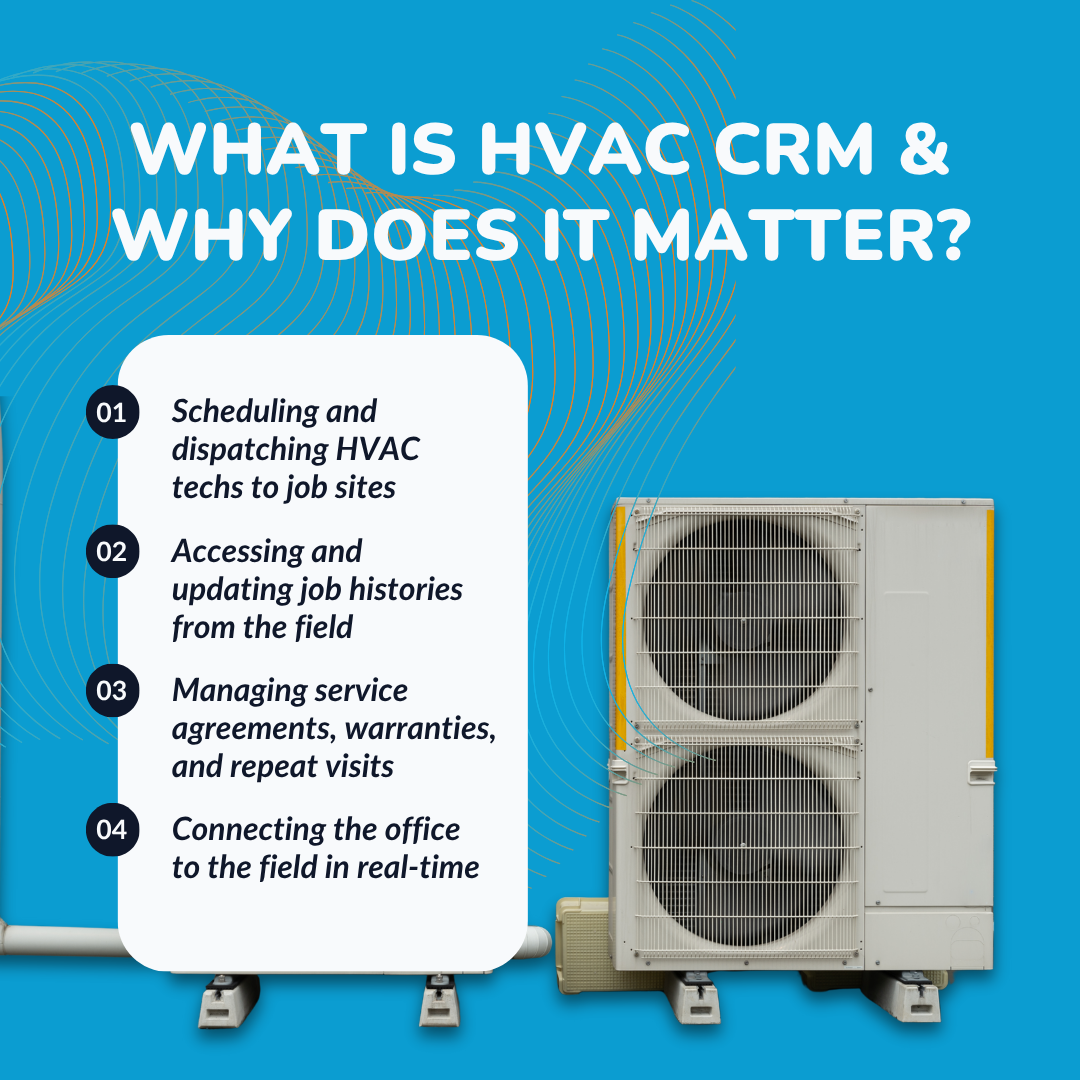
Think of HVAC CRM software as your all-in-one tool to manage everything that matters: your customers, your technicians, your sales, and your schedule. It’s like going from a toolbox complete of mismatched wrenches to a fully stocked, organized van.
HVAC CRM systems integrate customer management, job scheduling, invoicing, inventory tracking, and field service communication, all within a single platform.
So what makes HVAC CRM different from a regular CRM?
A general-purpose CRM might help you keep track of contacts, maybe even log calls or send emails. But HVAC CRM software is built for field service realities:
- Scheduling and dispatching HVAC techs to job sites
- Accessing and updating job histories from the field
- Managing service agreements, warranties, and repeat visits
- Connecting the office to the field in real-time
And most importantly, it helps you do the one thing that fuels growth and builds better customer relationships.
Certainly, it is important to recognize that HVAC is more than just repairing broken units. It’s about being reliable, responsive, and remembered.
That only happens when your entire business, from your techs to your sales reps, has instant access to the customer information they need to deliver exceptional service every time.
7 Signs Your HVAC Business Needs a CRM in 2025
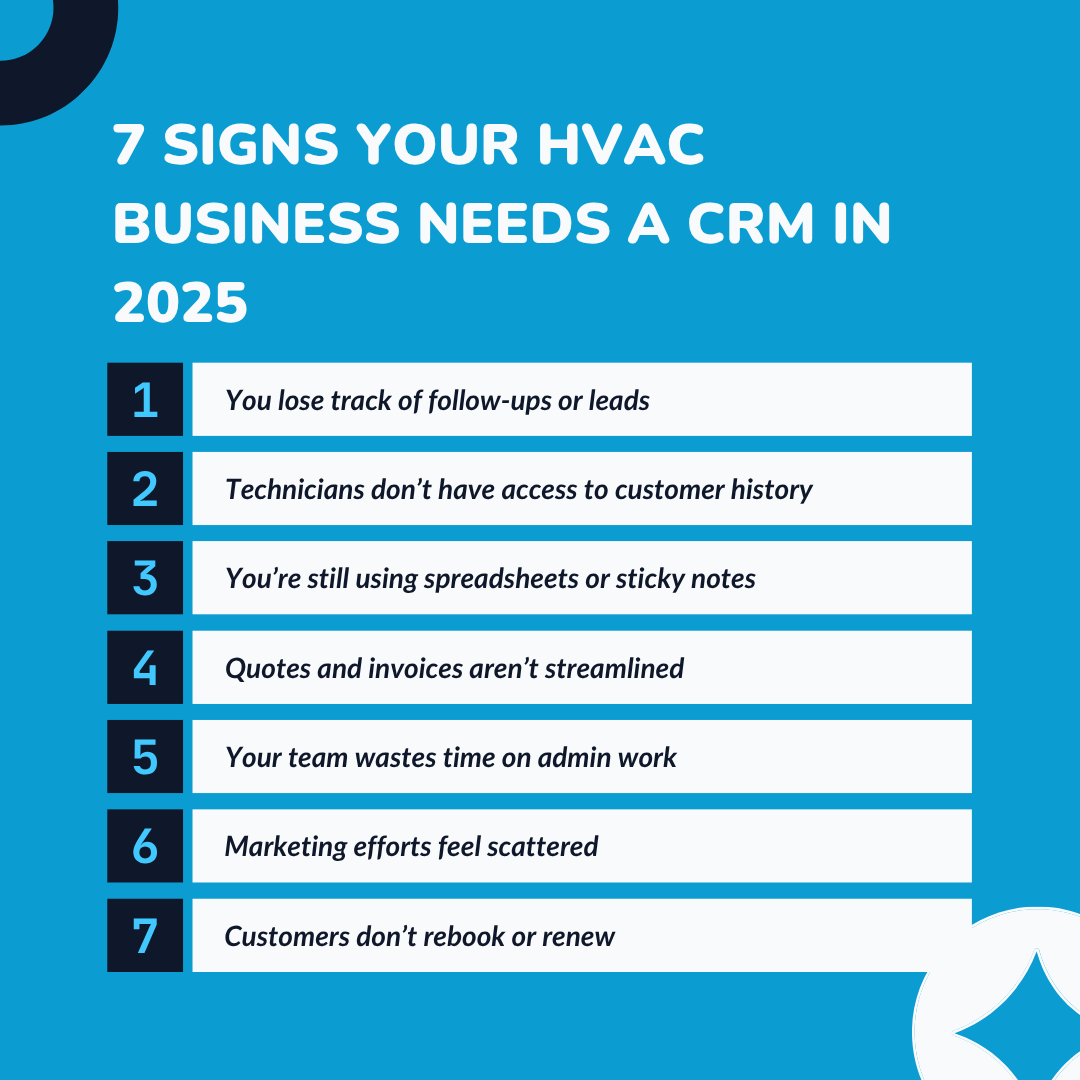
Still unsure if CRM software is right for you? Check out these warning signs. If any of these resonate with you, consider exploring better tools that can help you out.
1. You lose track of follow-ups or leads
That potential customer who called last week? Gone. Without a solid lead management system, you’re letting hot opportunities go cold.
HVAC CRM software helps you track every inquiry, whether it came from a web form, a phone call, or a marketing campaign.
2. Technicians don’t have access to customer history
Imagine sending a tech to a service call without knowing the last repair done, warranty details, or unit type.
Not only does it frustrate your tech team, but it also risks compromising customer satisfaction. However, with a CRM, your HVAC technicians can pull up job
details on the go.
3. You’re still using spreadsheets or sticky notes
Old-school methods might have worked when it was just you. But as your HVAC business grows, so does the complexity. Manual processes create bottlenecks, whereas CRM software replaces those outdated tools with innovative customer management tools that scale.
4. Quotes and invoices aren’t streamlined
Are you still typing up quotes in Word and chasing down payments by email? Modern HVAC CRM systems come with payment processing, quote generation, and even QuickBooks integration, so your sales processes and billing are smooth and fast.
5. Your team wastes time on admin work
From duplicate data entry to hunting down service histories, wasted time adds up. An HVAC CRM automates these tasks, freeing up your team to focus on serving customers and growing the business.
6. Marketing efforts feel scattered
Sending out a promo for spring tune-ups, but don’t know who’s due? A CRM helps you analyze business performance, target the right customers, and send personalized messages that convert.
7. Customers don’t rebook or renew
If you’re not reminding customers about annual maintenance or warranty checks, they’ll forget. And you’ll lose revenue. HVAC CRM systems send automated reminders, making it easy for customers to stay on schedule and stay loyal.
To improve your HVAC business, consider reading: How to Improve Customer Service in HVAC with Management Software.
How HVAC CRM Software Solves Real Problems
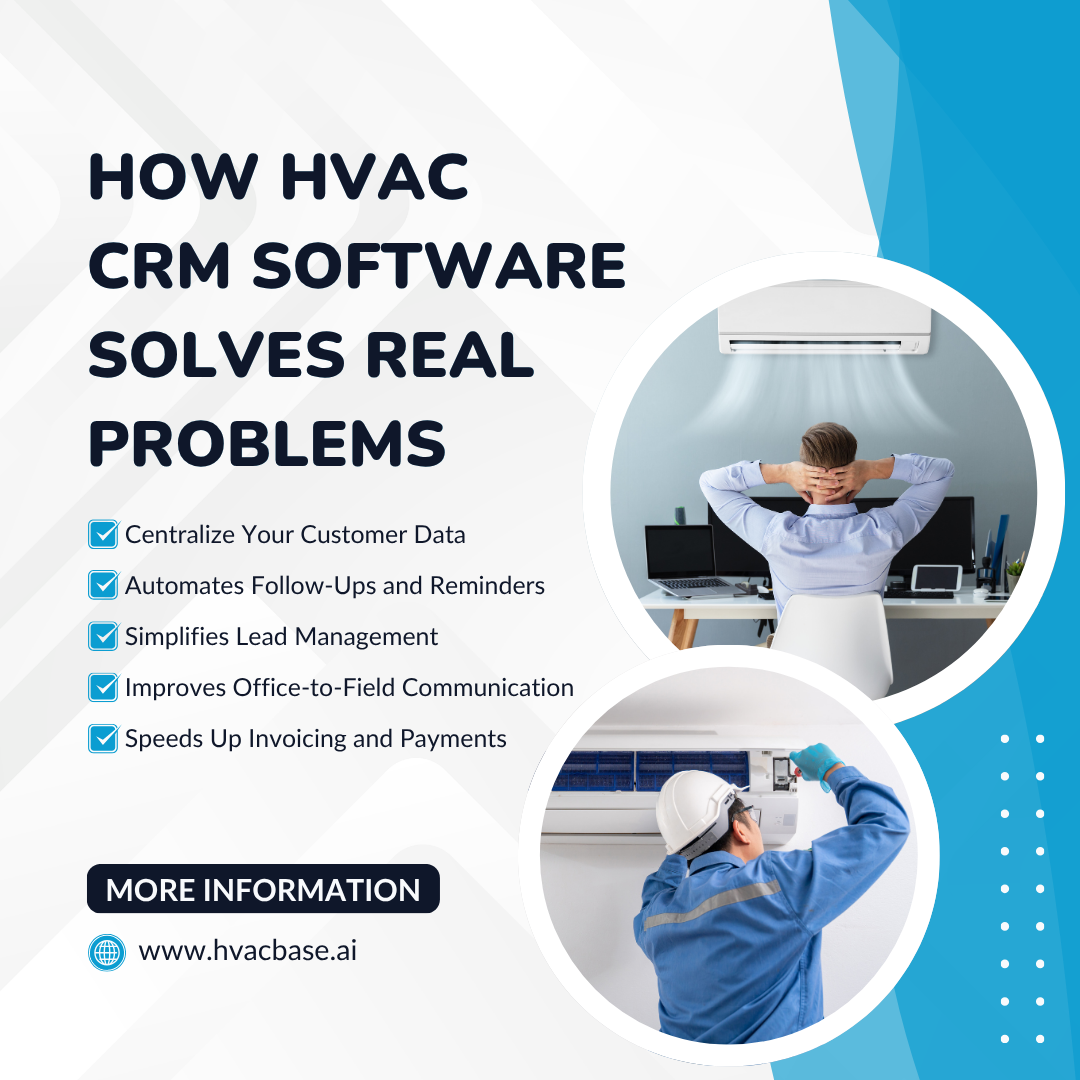
Running an HVAC business isn’t just about fixing systems; it’s about managing chaos. Schedules, calls, invoices, inventory, customer follow-ups. It adds up fast.
That’s exactly where HVAC CRM software shines.
Let’s break down how the right customer relationship management software doesn’t just organize your business, it transforms it.
I. Centralize Your Customer Data
No more scattered notes, disconnected systems, or memory-based guesswork. With an HVAC CRM, customer information lives in one place:
- Contact details
- Service history
- Quotes, invoices, and payment status
- Notes from past calls or site visits
This isn’t just handy, it’s a game-changer for field service businesses. When your techs arrive at a job site, they know what’s been done, what’s pending, and how to deliver the best outcome.
Everyone, from dispatchers to sales representatives to HVAC technicians, can access the same accurate information, leading to fewer mistakes and much smoother customer interactions.
II. Automates Follow-Ups and Reminders
Remembering every warranty renewal, seasonal tune-up, or payment due date is nearly impossible when you’re managing dozens (or hundreds) of clients.
An HVAC CRM takes that off your plate. So, you can:
- Set automated follow-up emails after service calls
- Send SMS reminders for appointments
- Nudge clients when it’s time to renew service agreements or pay invoices
This slight touch has a significant impact on customer satisfaction. People love feeling remembered and taken care of, which in turn builds loyalty.
III. Simplifies Lead Management
Without a CRM, it’s easy to lose sight of your sales pipeline. A form comes in, someone jots it down, and the lead gets cold. Sound familiar?
CRM software tracks every lead, from call to close. It tells you:
- Where each lead came from
- Who followed up and when
- Where leads are getting stuck in the sales process
This visibility helps your sales reps focus on what works and close more deals. Additionally, you can utilize marketing tools for enhanced targeting and follow-up.
IV. Improves Office-to-Field Communication
Let’s say a customer calls in to reschedule while your tech is already en route. Or a tech needs to upload photos from the job. Without a CRM, relaying that info is a headache.
Modern HVAC CRMs come with a mobile app for techs and a web dashboard for the office. You get:
- Real-time updates from the field
- Access to job progress, notes, and photos
- Instant communication between the office and the team on-site
This reduces calls, confusion, and wasted trips, ensuring your entire team stays in sync.
V. Speeds Up Invoicing and Payments
In 2025, speed matters especially when it comes to getting paid. With HVAC CRM software, you can:
- Create quotes and convert them into invoices with one click
- Accept payments via card or ACH on the spot
- Sync everything with your accounting software, like QuickBooks
And if you’re offering service agreements or financing, it handles that too.
No more chasing payments for weeks. No more paperwork headaches. Just faster, cleaner billing.
91% of companies with more than 10 employees have adopted CRM systems, making it a must-have tool for business operations in 2025.
How CRM Helps Grow Your HVAC Business
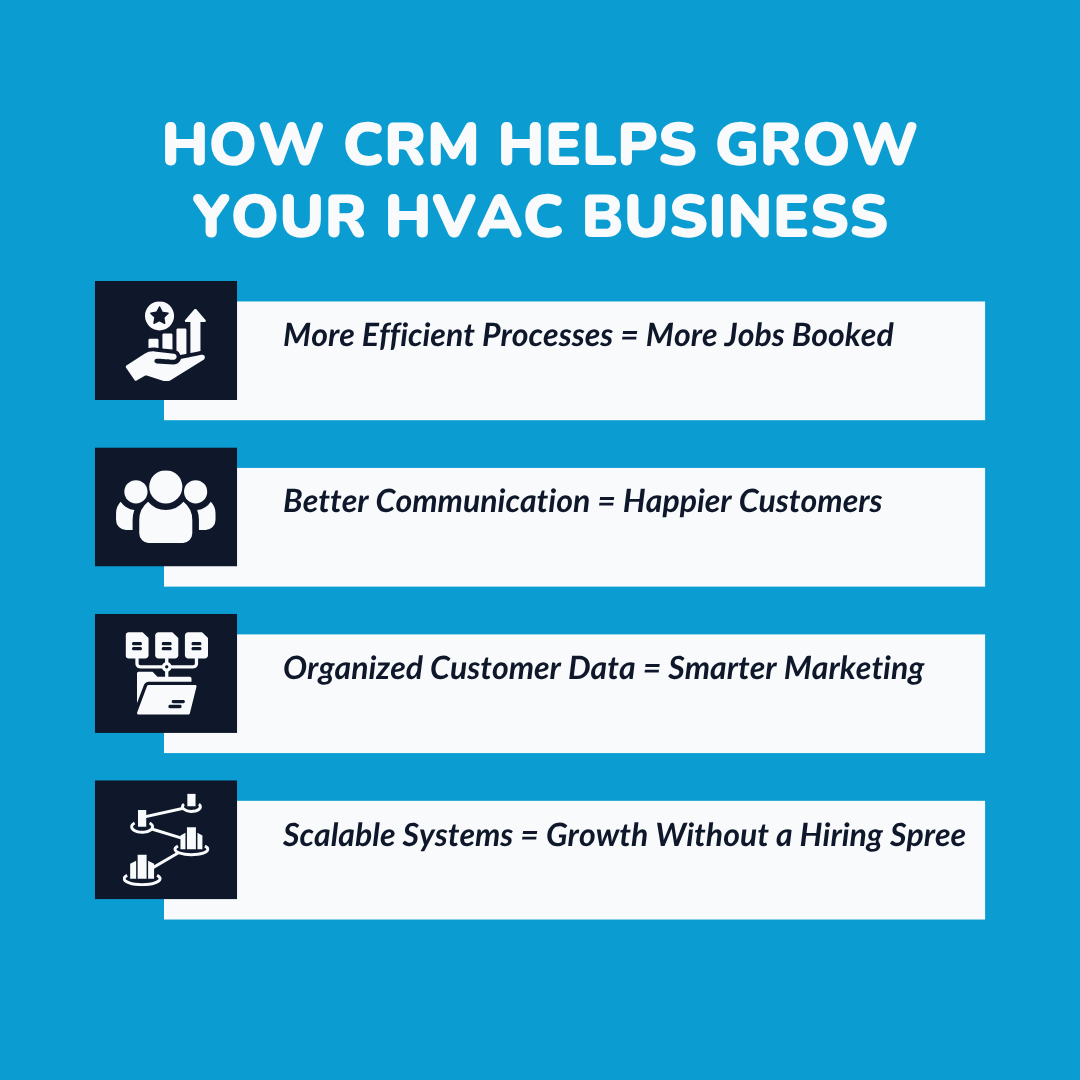
Growth isn’t about doing more. It’s about doing better by streamlining your business processes, allowing you to scale without breaking.
Here’s how HVAC CRM software becomes your secret weapon for smart growth:
- More Efficient Processes = More Jobs Booked
With automated scheduling, invoicing, and reminders, your team spends less time on admin and more time servicing customers. - Better Communication = Happier Customers
When your office and field teams are connected, and customers get timely updates, you create memorable service, not just transactions. - Organized Customer Data = Smarter Marketing
Target upsells based on service history. Run promotions for tune-ups. Your CRM makes it easy. - Scalable Systems = Growth Without a Hiring Spree
You don’t need to double your admin staff to double your revenue. You need better tools. CRM software handles the heavy lifting as you grow.
To know more about how HVAC CRM can help you, have a look at: What is HVAC CRM Software and How Can It Grow Your Business?
Common Mistakes to Avoid When Choosing a CRM
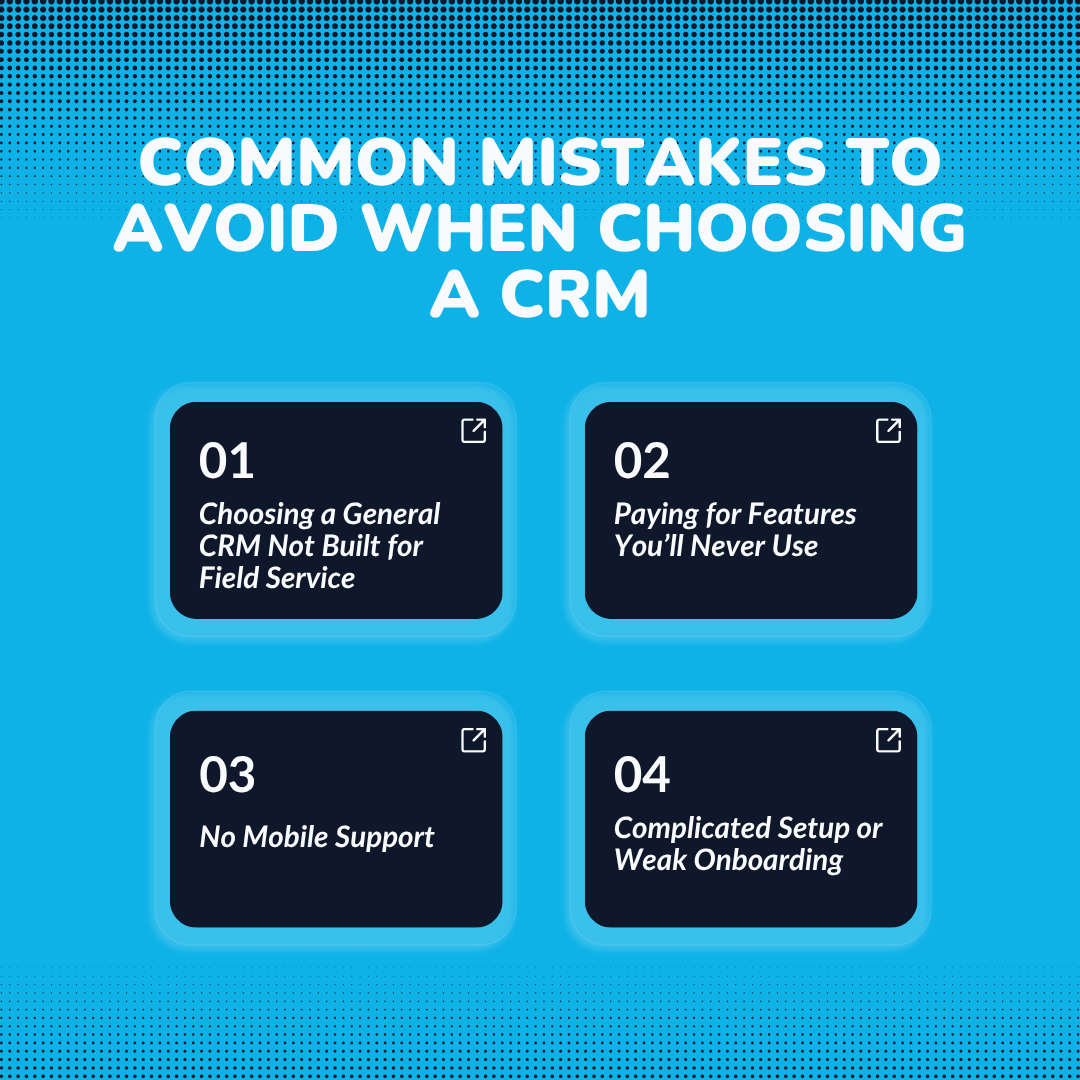
Not all CRMs are created equal. Picking the wrong one could cost more time and money than you bargained for. Here are a few traps to avoid:
1. Choosing a General CRM Not Built for Field Service
A generic CRM might handle leads, but what about dispatching technicians, managing jobs, or syncing with your inventory? Always opt for a CRM designed specifically for field service businesses.
2. Paying for Features You’ll Never Use
Bells and whistles are great, but not if they confuse your team. Focus on key features you need: job scheduling, dispatch, billing, and customer data management.
3. No Mobile Support
Your techs aren’t sitting in the office. They need a mobile app that works seamlessly in the field, even offline if required.
4. Complicated Setup or Weak Onboarding
Even the best software falls short if your team doesn’t know how to use it effectively. Look for platforms with intuitive UX and strong customer support.
Real-World Impact: How HVAC CRMs Improve Customer Experience
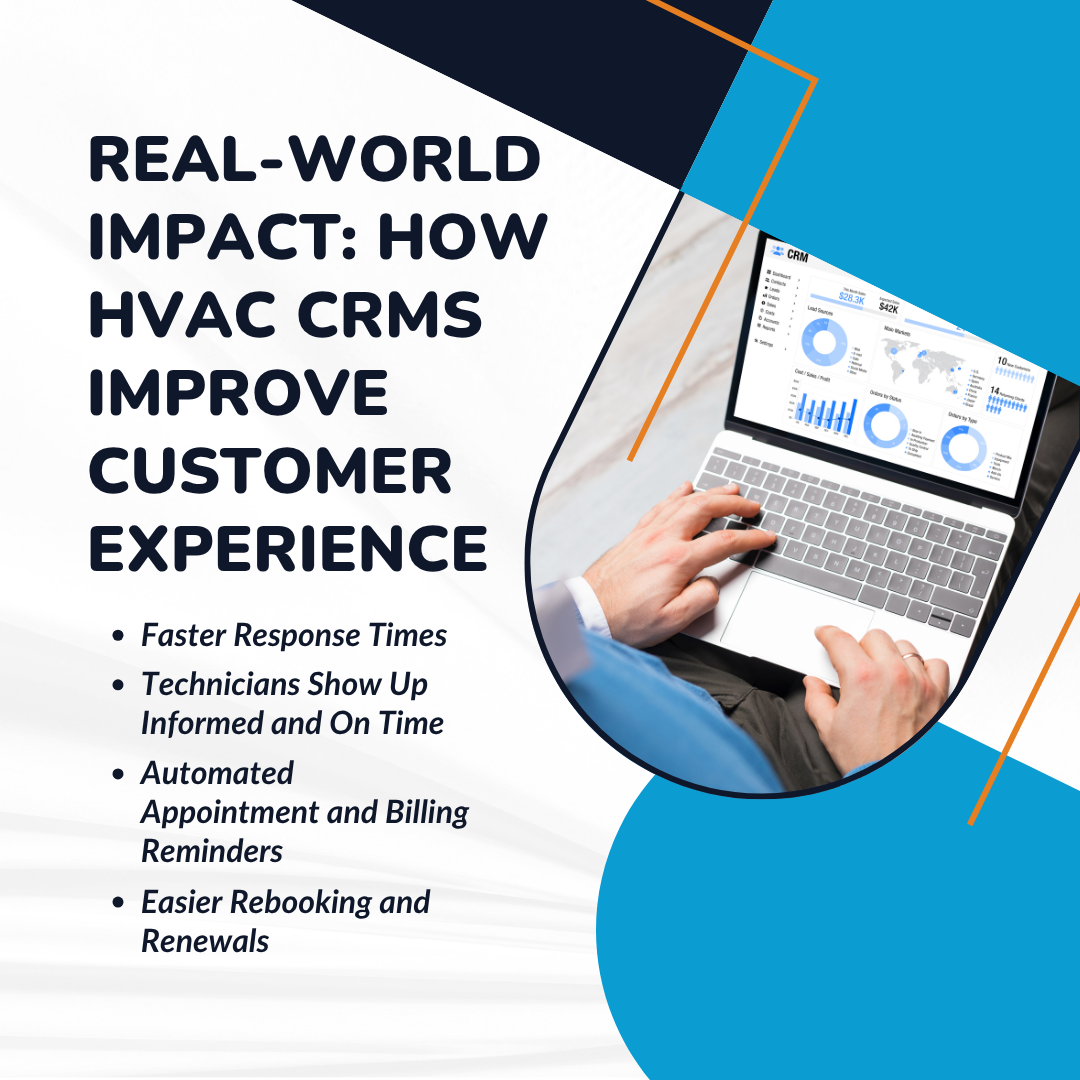
Let’s talk outcomes because when you implement a solid HVAC CRM, the effects extend beyond your team; they touch every customer interaction.
- Faster Response Times
No more long holds or delayed callbacks. Customers book faster, get updates instantly, and feel like a priority. - Technicians Show Up Informed and On Time
Armed with service history, unit specs, and notes, your techs walk in ready, not guessing. - Automated Appointment and Billing Reminders
Customers love reminders for service windows, quotes, and due payments. It adds a polished touch. - Easier Rebooking and Renewals
With CRM-powered follow-ups, staying on customers’ radars is automatic. That means more repeat business and glowing reviews.
An HVAC CRM doesn’t just make your team’s life easier; it directly enhances customer satisfaction. And that’s what keeps your calendar full and your reputation strong.
Why HVACBase CRM Is Built for Modern HVAC Teams
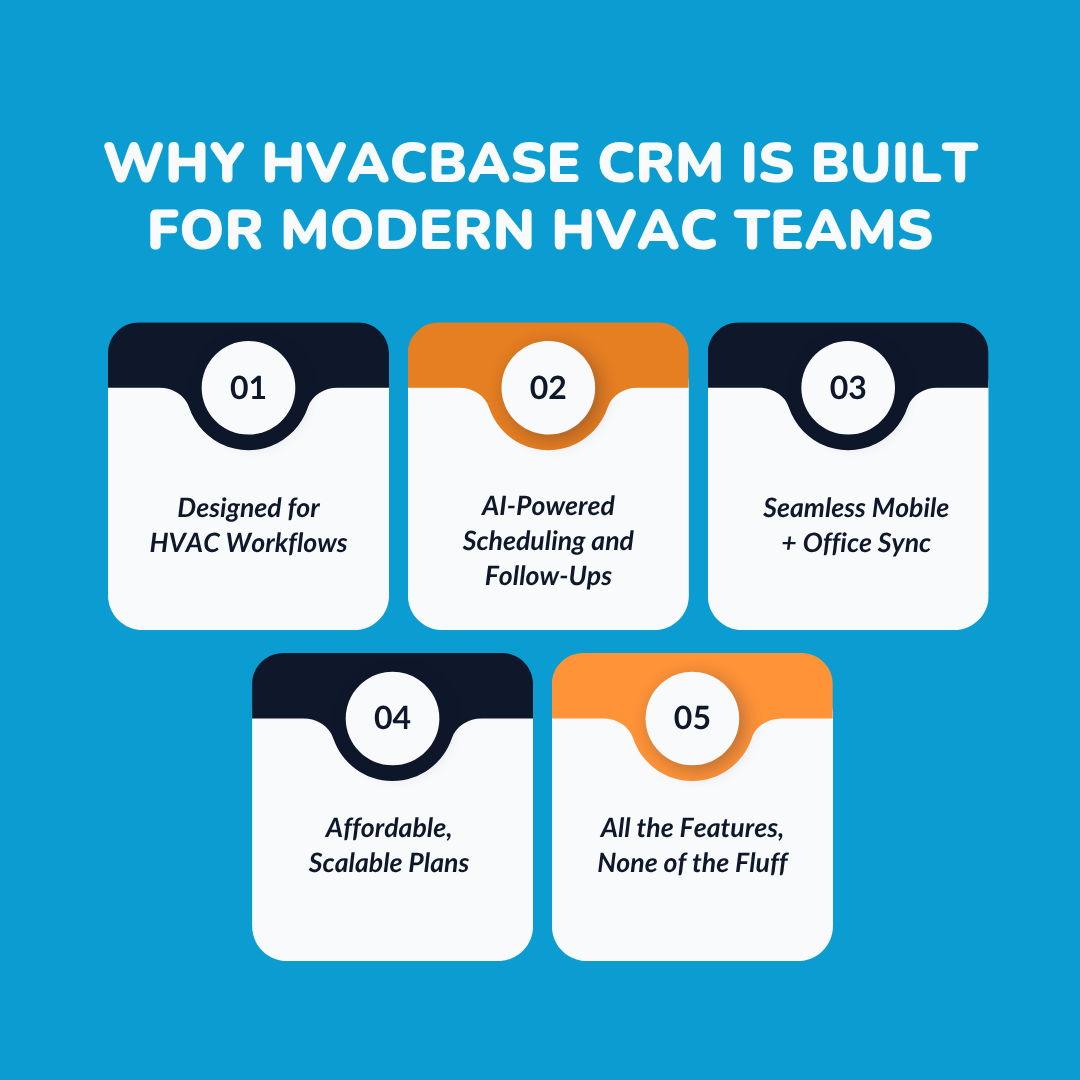
Your business is unique, so why settle for generic tools? Let’s choose solutions that truly fit your needs and help you stand out.
HVACBase CRM is built for contractors just like you. It’s not a one-size-fits-all system. It’s purpose-built software for HVAC, designed to match your daily workflow.
Here’s what sets HVACBase apart:
- Designed for HVAC Workflows
From job scheduling to inventory management to billing, HVACBase was made with contractors in mind, not adapted from another industry. - AI-Powered Scheduling and Follow-Ups
Automatically assign techs based on location, skill set, and availability. Plus, get nudges when it’s time to follow up with leads or clients. - Seamless Mobile + Office Sync
Your techs get full access to job details on the go. The office receives real-time status updates. Everyone stays aligned. - Affordable, Scalable Plans
Whether you're a small business or scaling fast, HVACBase grows with you. No bloated features. No bloated pricing. - All the Features, No Fluff
From GPS tracking to processing payments, tracking service history, and analyzing business performance, HVACBase helps you run your entire business from one place.
And the best part? You can test it without any risk using a demo, and no credit card is needed.
65% of sales representatives using mobile CRM apps attract higher quality leads compared to those who don’t leverage mobile tools for customer communication and field access
Your CRM Isn’t Just Software, It’s a Growth Engine
There’s a reason top HVAC companies are investing in better systems. The correct HVAC CRM doesn’t just help you manage jobs; it changes how you operate.
It enhances customer communication, automates tedious tasks, improves sales efficiency, and fosters lasting customer relationships. It also helps you track, plan, and grow with confidence, without burning out your team.
In 2025, the winners in the HVAC industry won’t be the ones working the hardest. They’ll be the ones working the smartest, with tools that support their entire team, every step of the way.
Don’t wait. Explore CRM tools that actually fit how your HVAC business runs and get back to doing what you do best: delivering exceptional service.
Take Control of Your HVAC Business Today
Don’t let disorganized schedules, missed follow-ups, or lost leads hold you back. See how HVACBase CRM can help you streamline operations, improve customer satisfaction, and grow your HVAC business with ease.
Book your demo now and experience the CRM software explicitly built for HVAC professionals.
FAQs:
What is HVAC CRM software?
HVAC CRM software helps manage customer data, schedule jobs, track service history, and improve communication for HVAC businesses.
Why do HVAC companies need CRM in 2025?
CRM software boosts efficiency, automates follow-ups, and improves customer satisfaction in today’s fast-paced HVAC industry.
Can HVAC CRM help with job scheduling?
Yes, it enables you to schedule and dispatch technicians efficiently, reducing delays and improving service call response times.
Is CRM a helpful software for small HVAC businesses?
Absolutely. HVAC CRM helps small teams stay organized, manage leads, and scale without extra admin work.
Have questions or need personalized advice?
Talk to an Expert Today and let our construction specialists guide you to success.


